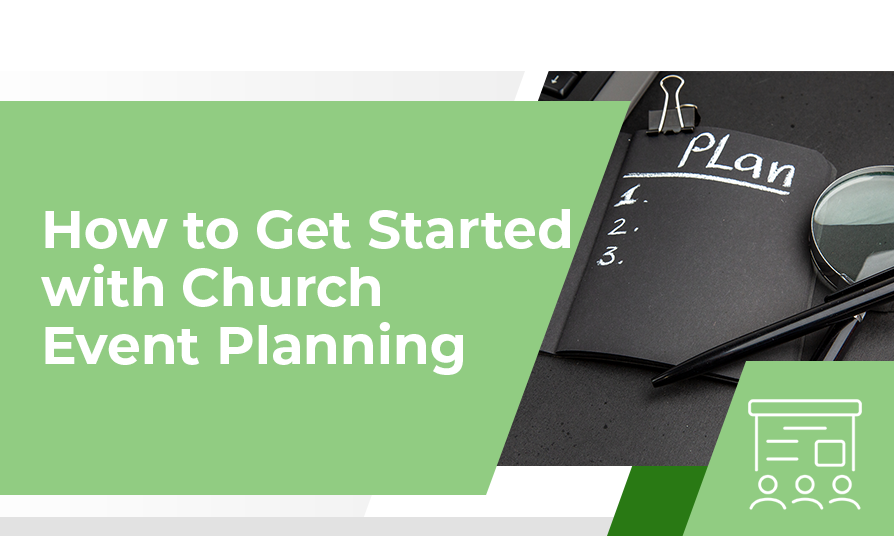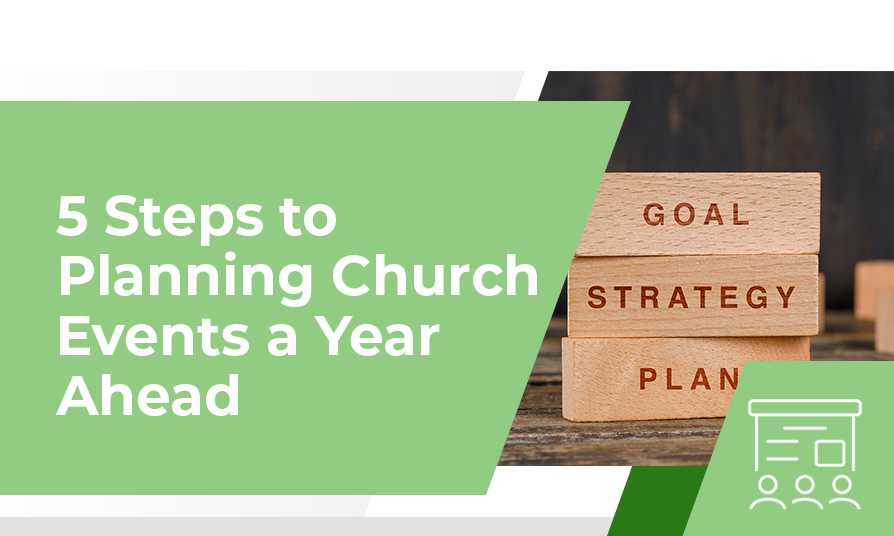Church events can cultivate deeper relationships within a congregation and attract more members of a community to the church. Hosting events can also put a tremendous strain on church staff and volunteers. Here’s how to get started with church event planning to increase event success and reduce stress for your team.
Think of all the church events each year:
- Easter
- Mother’s Day
- Father’s Day
- Summer Camp or VBS
- Back-to-School Bash
- Fall Festival
- Thanksgiving Outreach
- Christmas Plays and special services
- Community Outreaches
- Volunteer Appreciation Night
- Marriage Weekend
- Financial Seminars
- Small Group Launch
- …and more
Now, think back to the week before these events. What does that week look and feel like?
- Each day, you (and several other staff members) work until the wee hours of the morning.
- The number of people who’ve registered is much less than you’d hoped would attend.
- The pastor keeps stopping by to see if everything is ready yet and doesn’t understand why it isn’t.
- You don’t have enough volunteers for the event.
- It’s at the point where you’ve accepted that something is going to fall through the cracks…and there’s not much you can do about it now.
Sound familiar?
I’ve been there and have worked with churches facing the same challenges. However, I’ve also learned how to avoid those scenarios and have successful (not stressful) events.
With a bit of proactive thinking, a standard process, and some disciplined effort, you can eliminate the last-minute chaos and experience events that exceed your expectations.
Here’s how to get started:
Step #1: Create an Annual Church Event Calendar
Events can be incredible ministry tools. Unfortunately, they can also drain your budget and burn out your staff and volunteers. It is possible, however, to get all the benefits of hosting events without all the trouble. How do you do it? Plan in advance. In fact, I recommend a year out.
You don’t have to create a detailed to-do list a year ahead, but you should at least decide which events your church will host for the year. By doing this early, your team will have time to get all their ideas on the table, discuss what events are best at each time of year, and determine whether or not you need to space the events out.
Here’s how to get started planning church events a year ahead:
1) Put All Potential Events on the Calendar
This is the fun part: Get a huge wall calendar (erasable is best) and write out every event you intend to host in the upcoming year. Have each ministry department leader put their events on the calendar and make sure you include all church-wide events. If possible, include information about each sermon series as well.
2) Conduct a Calendar Review Meeting
Once you’ve written them all down in one calendar, organize an event review meeting. It’s important to have all ministry department leaders, the Executive Pastor, Senior Pastor, and ministry support department leaders (Finance, Communications, Facilities, etc.) participate in this calendar review.
3) Discuss the Calendar
At the calendar review meeting, address the details of each event you’re intending to host. Here are some questions to help you move along the discussion:
- Have we hosted this event before? If so, was it successful? If not, why do we want to do it again?
- Do we have too many events within a 4- to 6-week timeframe? If so, which ones can we move — if they aren’t specific to a season or holiday — or eliminate?
- What else is going on in our church or community that might conflict with any of these events? For example:
- Does your community host a large charity race, fair, parade, or another big event that would conflict with a potential church event?
- Do you have any remodeling or building projects coming up that could impact your ability to host an event during a certain timeframe?
- For summertime events: How engaged is your congregation in church events during the summer months? Do most people take a vacation or do they stay around town? Consider this before planning too many summer activities.
4) Evaluate the Workload
Dive even deeper into your review discussion by evaluating the possible workload issues that could arise with too many events.
Ask yourselves these questions:
- If you have several events within a 4- to 6-week timeframe, do you have enough volunteers to cover them without them having to work on more than one event?
- Does your staff have the capacity to handle the preparation for several events at once? For example, can your Communications department create graphics, webpages, video announcements, and other promotional materials for multiple events at the same time? Even if many of the events are department-specific, the supporting departments will work on more than one event at a time.
Step #2: Establish a Budget for Each Event
Next, you’ll need to create a budget for each individual event. Here’s a list of items you should account for when creating a detailed budget:
Marketing — To promote your church event, you’ll need marketing communication. This includes things like website design, logos, advertisements, flyers, and email newsletters.
Guest Speakers — If you plan on bringing outside guest speakers to your event, you’ll need to account for honorariums as well as their travel and lodging expenses.
Catering — Meals or snacks at events can sometimes take a huge portion of the budget. Consider asking for donations from local restaurants or having several church members make the food as a part of their volunteer service.
Equipment and Decor Rentals — This may include renting tables, chairs, three-way radios for communication, tents, sound and lighting equipment, etc.
Signage — Most likely, you will need signs around the church campus to help event participants locate key areas.
Merchandise — If you plan to sell books, DVDs, or other items at the event, you’ll need to figure in your initial purchasing costs for these items.
Security — For larger gatherings, you may want to hire off-duty law enforcement officers or other security personnel to ensure a safe event space.
Print Materials — Some extra print materials may include name tags, staff lanyards, workbooks, handouts, etc.
Once you’ve created a proposed budget for each event, you’ll need to put it through your church’s review process. Depending on how your church handles the annual budgeting process, budgets for events may roll up into each department’s budget for the year. Regardless of how this is handled, you should review each event budget before approving the event to take place. If an event is too costly, it can often be scaled back instead of cut altogether. That’s why reviewing is such an important step to the budgeting process.
Step #3: Assign an Event Planner to Each Event
To effectively coordinate all the tasks related to making an event happen, you need a single person who’s responsible for keeping track of those tasks and each team member’s progress. Otherwise, you’re hoping everyone is getting their work done on time instead of actually knowing that they are doing so. At this point, designate one person as the main event planner.
By having an experienced event planner in charge, you’re able to avoid the headaches that can sometimes arise with events. For example, do any of these sound familiar?
- A lack of communication between departments on who’s in charge of certain details.
- Poor attendee turnout.
- A last-minute rush to get things done the week prior.
- If there’s any type of friction during your event planning process, that could be a sign of too many chiefs. Hire or appoint an event planner to organize your events and keep everyone on the same page.
But what exactly does an event planner do?
Here’s a list of the main tasks an event planner will handle to make your event a roaring success.
Identify the “why” behind an event
Before getting to the details, a church event planner first wants to know the reason for having an event. This involves working with church leadership to determine the overall vision and scope of the effort. Here are a few questions the event planner will ask:
- Why are we doing this?
- What are we trying to accomplish?
- Does this align with our overall church mission?
The answers to these questions will drive all decisions about the event, so this is a vital step to complete.
Lead the planning team
An event planner may be in charge, but they aren’t the only person doing work. It’s their job to create and collaborate with a planning team (staff and/or volunteers) to identify the tasks required to make an event a success. Once tasks are divided out by the planner, it’s their job to continually monitor the progress of team members and keep everyone on schedule. A few other responsibilities include:
- Making sure the team stays within budget
- Keeping senior leadership informed
- Conducting weekly reporting through a dashboard reporting format
- Raising potential issues with those responsible by discussing what the issue is, likely causes of it, and possible solutions (including the cost or impact of each)
- Ensure the team communicates effectively
To keep the planning team, church leadership, and departments on the same page, an event planner will coordinate meetings throughout the planning process. To ensure an effective meeting, an event planner should develop a meeting agenda, make sure the appropriate parties are invited to the meeting, capture action items and decisions during the meeting, and follow up with a written review afterward. It’s also crucial to make it clear the function of each department. Many times, double work is done because of a lack of communication between departments. A wise event planner will guide all leaders within the church to understand one another’s roles, which will lead to better, more effective communication.
Oversee the team’s activities on the day of the event
As the head of the event, the event planner will oversee the entire team’s activities on the event day. They’ll check in periodically throughout the event to help where needed, answer questions, and provide direction. Having this point of contact is not only beneficial for the planning team when issues arise, but it also creates a level of professionalism noticed by event attendees.
Capture lessons learned and all key event data after the event
How do you make your next event better? By conducting a “lessons learned” meeting with your team afterward. Adding an event planner doesn’t mean you won’t have any issues come up, but it does mean you have someone to direct feedback toward in order to better plan for future events. The event planner will gather this feedback, along with other key event data — such as final attendee count, complaints, and merchandise purchased — to plan consistently better events long term.
The role of the event planner isn’t easy. With this in mind, find someone who is detail-oriented, respected by his/her peers, has a proven ability to lead a team effectively, and who is dedicated to the vision of the church. Whomever you place in this role, make sure you provide him/her with your full support. If you haven’t had a standard event planning process or a central event planner before, this will be a significant change for the rest of the staff. Communicate with your team; help them understand why you’re making this change and address how it will save them time and frustration in the long run.
Step #4: Use a Standard Church Event Planning Process
You can avoid the last-minute scrambling, late nights, and frustrating meetings by using a repeatable process for planning each event (Hint: I teach this process in The Church Event Planning Course.). A standard process helps everyone know what to expect, what’s expected of them, and how to proceed with pulling off an amazing event. From small gatherings for a marriage retreat to thousands of people at an outreach, this planning process flat out works:
1) Clarify the Vision
Know why you want to host this event, what success looks like for this event, etc.
2) Develop the Plan
Create a list of all the tasks you’ll need to complete in order to make this event happen. From buying decorations to scheduling volunteers, you want every possible task on the plan.
3) Assemble the Team
Most event planning teams will include a combination of staff and volunteers. Assign each person a specific role on the team and work with each individual to add to the plan based on their experience.
4) Execute the Plan
This is where the rubber meets the road and the team does the work. During this phase, the Event Planner should check in with each team member to verify progress and troubleshoot issues.
5) Monitor & Report Progress
You don’t want the Senior Pastor wondering whether anyone has registered for next month’s marriage retreat. The Event Planner should gather status updates about the event and report those to church leadership on a regular basis.
6) Facilitate Event Day
This is the culmination of months of planning and effort. By starting the planning process early and carefully tracking progress, this day should run smoothly and with minimal issues.
7) Lead Post-Event Activities
Event Day isn’t the end. Instead, you want to invest time in gathering lessons learned, pulling together event documentation, and celebrating as a team.
This is the process I cover in my book, The Church Event Planning Toolkit.
Step #5: Leverage Online Planning Tools
Most events require too many tasks to keep track of on paper or in someone’s head. With a team of staff and volunteers involved in preparing for the event, you want a tool that everyone can access and update quickly. Thankfully, there are several online planning tools available that can make coordinating planning efforts much easier. Personally, I’ve used Asana, Basecamp, Trello, Monday, and Teamwork to varying degrees. Each one includes the basic functions you’ll need and probably a few extras.
Which one is best for your church? That depends on what you need, how many people need access to it, and how much you’re willing to pay. Most of these vendors have a free option or at least a free trial, so you can test it out to see if it’ll be a good fit. Regardless of which one you choose, be consistent. Require every team member to use the tool, updating it at least weekly. Do as much communication within the tool instead of via email or meetings to save time.
In addition to online planning tools, you might want to review this list of event registration tools.
Going from a big vision for an event to seeing it become reality takes a great deal of time, effort, and coordination. By planning ahead, using a standard process, assigning an event planner, and leveraging online tools, you’ll save your church time and money along the way.
To learn more, check out The Church Event Planning Toolkit book and The Church Event Planning Course.





